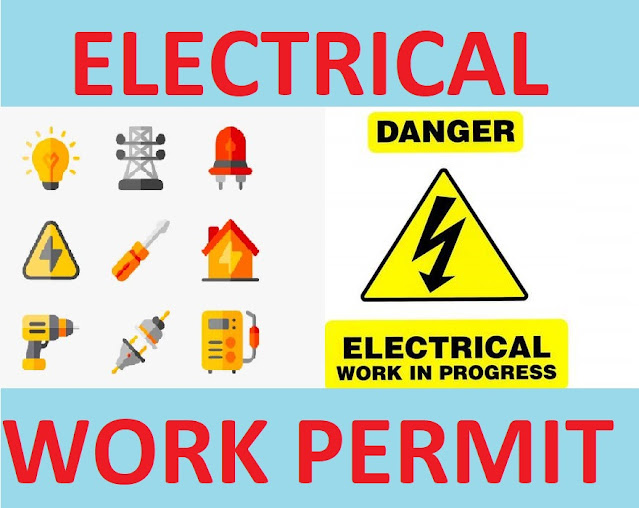Electrical Work | Permit To Work (PTW)
Template Sample | Example Form Word
Document Free
LOCKOUT TAGOUT SAFETY TRAINING VIDEO
Electrical Work | Permit To Work (PTW) Template Sample |
Example Form Word Document Free
What are the hazards?
The main hazards of working with
electricity are:
Primary hazards like Electric shock
and burns from contact with live electrical parts
Secondary hazards like fall from
height
Injury from exposure to arcing,
fire from faulty electrical equipment or installations
Explosion caused by unsuitable
electrical apparatus or static electricity igniting flammable vapours or dusts,
for example in a spray paint booth
Electric shocks can also lead to
other types of injury, for example by causing a fall from ladders or scaffolds
etc.
Basic points to remember while executing the electrical work are:
Ensure that employees know how to
use the electrical equipment safely
Make sure enough power sockets are
available. Check that socket outlets are not overloaded by using unfused
adaptors as this can cause fires
Ensure there are no trailing cables
that can cause people to trip or fall
Always Switch off and unplug
appliances before cleaning or adjusting them
Ensure everyone looks for
electrical wires, cables or equipment near where they are going to work and
check for signs warning of dangers from electricity, or any other hazard. Checks
should be made around the job, and remember that electrical cables may be
within walls, floors and ceilings (especially when drilling into these
locations) etc
Engage only competent persons in
electrical works, Make sure anyone working with electricity has sufficient
skills, knowledge and experience to do so. Incorrectly wiring a plug can be
dangerous and lead to fatal accidents or fires
FREE - ISO 45001 AUDIT CHECKLIST : PART 2
Stop using equipment immediately if
it appears to be faulty – have it checked by a competent person
Ensure any electrical equipment
brought to work by employees, or any hired or borrowed, is suitable for use
before using it and remains suitable by being maintained as necessary
Consider using a residual current device (RCD) between the electrical supply and the equipment, especially when working outdoors, or within a wet or confined place.





No comments:
Post a Comment